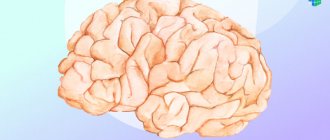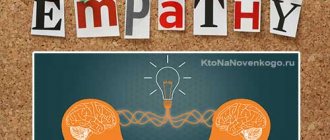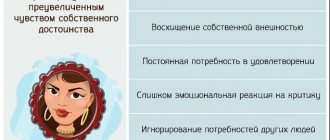The well-known technique was developed by an experienced American psychologist, neurologist Howard Gardner. He was the first to introduce the concept of multiple intelligences into medical and psychological terminology. This theory, based on many years of research into the brain of a large number of people at different levels of development (gifted, with mental retardation, various diseases of neurogenic origin, etc.), made it possible to refute the existing concept of monointelligence.
MULTIPLE INTELLIGENCE IS THE BASIS OF THE THEORY OF CHILD DEVELOPMENT:
As a result of a long study of the functioning of the brain, Howard Gardner concluded that a person does not have one single intelligence, but several. Each of the individual intellects is “located” in different parts of the brain. Their development depends on the conditions that were created for the child for this. Each child has his own unique combination of “intelligences.” A person’s abilities, skills, and talents are determined by the level and degree of development of one or another intelligence (or several at the same time). This explains the fact that some children have more pronounced inclinations towards logic and mathematics, others towards nature, and still others towards art and creativity. Using this unique theory, it is possible and necessary to build a child’s learning and development in such a way as to ensure a harmonious and individual approach to everyone. After all, tasks and exercises for children with different combinations of intelligence types according to Gardner will differ significantly.
Interpersonal
One of the most useful of Gardner's 8 main types of intelligence is interpersonal. Thanks to him, children easily interact with others, know how to make a good impression, feel other people and become good leaders. In any company, such a child turns all attention to himself and becomes the center of the general fun.
What children with interpersonal intelligence can become:
- Politician;
- Diplomat;
- Director;
- Businessman;
- Manager;
- Speaker;
- Teacher.
The main way to develop such intelligence is through communication. Children should be provided with the opportunity to participate in various discussions, stage performances, and organization of events. A visit to a theater group can have a good effect.
Having determined the child’s type of intelligence, it is worth focusing on developing it, giving up attempts to “awaken” other skills.
ROLE OF PARENTS AND TEACHERS:
Individualization of the learning process has long been one of the common problems in pedagogy. With the advent of Howard Gardner's theory, many educators, teachers and parents began to think that approaches to the learning and development of different children should be significantly different. Considering their intellectual profiles, which are formed as a result of greater development of mini-intelligences of certain areas of the brain, parents, and later teachers, must take this into account when creating certain conditions for the development of these abilities. In this way, such a complex, but very real individual approach to the upbringing and development of each individual unique child will be ensured. With the advent of Howard Gardner's theory of multiple intelligences, the psychological and pedagogical theory was completely shaken, when a single intelligence could be unambiguously measured using a simple IQ test. The upbringing and development of all children according to one strict approved program is already considered irrational and incorrect. This disrupts the natural processes of the brain of each individual child’s unique personality. The differences between children are largely explained by the percentage of developed types of intelligence. Their future profession, inclinations and success in certain types of activities will depend on this. The task of teachers and parents is to facilitate the maximum development of the child’s talent and develop it in the future in precisely the ways that are most suitable for the individual child, taking into account the characteristics of his intellect according to Gardner. An individual training program and selected teaching methods, taking into account the child’s most developed ways of perceiving information, are the basis of Howard Gardner’s theory of multiple intelligences.
Logical-mathematical intelligence
Strengths: Problem analysis and mathematical operations. People with logical-mathematical intelligence are excellent at reasoning, recognizing patterns, and logically analyzing problems. These people tend to think conceptually about numbers, relationships, and patterns. People with logical-mathematical intelligence usually:
- have excellent problem solving skills;
- love to think about abstract ideas and concepts;
- love to conduct scientific experiments;
- capable of performing complex calculations.
Potential professions for such people are scientist, mathematician, programmer, engineer, accountant.
ESSENCE OF HOWARD GARDNER'S THEORY OF MULTIPLE INTELLIGENCES:
Howard Gardner proved that every person is born with nine types of intelligence.
When studying the types of intelligence that each individual child is endowed with, it is important to understand that each person has all nine varieties. They have a huge number of manifestations. You should never label a child as having only limited abilities. It is important, by providing an individual approach to the development and education of a child, to create conditions in which he could show his many sides and interests.
Spatial intelligence
The strengths of a person who has it include excellent visual and spatial perception. Such people visualize the world around them. They have no problems navigating an unfamiliar city, reading maps, diagrams, or processing videos and photographs. Possessors of spatial intelligence:
- love to read and write;
- solve puzzles without difficulty;
- easily interpret images, graphs and diagrams;
- love drawing, painting and fine arts.
Most often, such people become architects, artists, and engineers.
A LITTLE ABOUT EACH TYPE OF INTELLIGENCE:
Verbal-linguistic
Manifestations of this type of intelligence include the skillful use of words in various forms (oral, written).
Such children are happy to recite poems in public, sing, communicate a lot, love reading (as a rule, such children quickly and early learn to read and write), and writing. They talk about everything with delight, love word games, and participate in theatrical productions. Children with manifestations of verbal-linguistic intelligence easily learn various languages, both foreign and native. If enough attention is paid to the development of this type of intelligence, then in the future the child can become a successful politician, journalist, speaker, teacher, writer, linguist. Visual-spatial
Such children have the ability to think creatively.
They can imagine and portray images. In children with developed visual-spatial intelligence, sensorimotor perception of the surrounding world is actively involved. What they imagine in their imagination is transferred to the actually created objects and products. People with a pronounced spatial type of intelligence are characterized by an excellent sense of forms. Visual perception in combination with certain knowledge, skills, and emotions contributes to the creation of a new vision of familiar images. Children with developed visual intelligence have a keen sense of colors, lines and relationships that exist between objects. If the right conditions are created for the development of such kids, in the future they will certainly prove themselves to be talented engineers, planners, designers, artists, sculptors and even chess players. Musical intelligence
(in some sources it is called musical-rhythmic intelligence) Children with developed musical intelligence perfectly perceive sound and react emotionally to it.
By creating conditions for music lessons and playing musical instruments, parents will contribute to the effective development of musical intelligence in the child. Children with a more pronounced type of intelligence are able to accurately repeat and reproduce sounds and musical works; they can easily master playing instruments. These children will become talented composers, musicians, music teachers, and vocal performers. Kinestatic intelligence
Children with developed kinestatic intelligence are distinguished by an excellent sense of their body and the ability to control movements, as well as dance, run, jump, gesture, and manipulate objects.
Children with pronounced kinestatic intelligence have well-developed physical qualities such as coordination, balance, agility, strength, and flexibility. Effective development of these abilities and talents will allow your child to become a professional athlete, practicing surgeon, magician, or dancer in the future. Logical-mathematical intelligence
Developed logical-mathematical intelligence is evidenced by a child’s ability to make inferences, vary abstract concepts, solve puzzles, understand the relationships between objects and phenomena (cause-and-effect relationships), and love for experiments and calculations.
This intelligence includes the ability to categorize, predict, think critically, and reason about various topics. Such children can think like little professors or scientists. They are very inquisitive and always want to get to the bottom of the truth. Such children successfully realize themselves in such professions as mathematician, physicist, doctor, programmer, scientist. Interpersonal intelligence
Manifestations of this intelligence include the ability to sense the mood, interests and feelings of people.
Such children subtly perceive facial expressions, timbre and tone of voice, and gestures. They are also sensitive to these “signals” and strive to help the interlocutor. Interpersonal intelligence includes nonverbal (without words) and verbal (with words) communication skills. Children with pronounced interpersonal intelligence feel great in joint games and are often the initiators. They can smooth out emerging conflicts or resolve existing ones. Kids know how to negotiate, manage others, and motivate them to achieve their goals. Such children grow up to be talented psychologists, public figures, businessmen, and service and sales workers. Any leader and manager must have strong manifestations of interpersonal intelligence. Intrapersonal Intelligence
Children with strong intrapersonal intelligence have an excellent ability to see themselves, their strengths and weaknesses.
They clearly assess their mood, emotions, desires and intentions. Children who have developed this type of intelligence are distinguished by their ability to self-discipline and self-esteem. Such children, even at a very early age, easily distinguish between feelings of pleasure and pain. Based on this, they make further independent decisions about participating in the current situation. To become a good teacher, philosopher, successful businessman, psychologist or person of intellectual work in the future, it is necessary to develop intrapersonal intelligence from childhood. Naturalistic intelligence
These children have a strong attraction to nature.
They learn with its help and get great pleasure from any activity that involves nature (bird watching, collecting insects, studying plants, caring for animals). Children with pronounced naturalistic intelligence love to go hiking, go to the mountains, and work in their garden. Since childhood, they have been interested in ecology, animals and plants. For these children, it is very important that the learning process takes place in open spaces as often as possible, rather than indoors. Children with pronounced naturalistic intelligence can become meteorologists, chemists, physicists, archaeologists, travelers, and biologists. Existential intelligence
Manifestations of this intelligence include the ability to philosophize and meditate (at an older age). Such kids are interested in history, religion, and like to talk a lot about pressing “life” issues. Children with these characteristics in the future will become successful journalists, as well as analysts, experts, philosophers, and public figures.
Musical
The last type is musical. Those who have such intelligence are very actively drawn to music. They quickly learn to play musical instruments, become interested in the work of famous musicians, strive to attend concerts, and play music loudly. Such people easily remember melodies, and often sing songs out loud, without thinking about what others will say.
What can a child with musical intelligence become in the future:
- Composer;
- Singer;
- DJ;
- Radio presenter;
- Sound engineer.
The best way to develop musical intelligence is to attend a special school, where the child will be taught to play the chosen instrument. The opportunity to speak publicly in front of peers will have a great positive effect.
If you develop skills in a child that are not related to his type of intelligence, he will still be drawn to “his” interests.
HOW TO APPLY THE THEORY TO AN INDIVIDUAL CHILD:
In fact, it is very difficult to find a place in the existing education system to implement the system and theory of Howard Gardner. The whole point is that general developmental programs developed and approved by the relevant authorities cannot be personality-oriented. In them, all children without exception are taught according to a template, without taking into account individual characteristics and more developed ways of perceiving new information. According to the author of the theory, the basic principle is that the educational process should be structured in such a way as to enable children to acquire experience and skills using various types of intelligence. The difficulty lies in the fact that it is very difficult for a teacher to remember and take into account simultaneously different learning styles, as well as the strengths and weaknesses of students during a lesson. In group classes, the verbal-linguistic type of intelligence is most often used. Teaching techniques such as lectures, writing on the board, writing papers, and note-taking are very important. Moreover, they are widely used in the education system, especially as students grow older. The task of educational institutions is the combination and integration of verbal-linguistic intelligence with other types. This will open up new and effective ways for your students to learn and experience. It is important to explain to children from an early age that they can reveal their abilities in various ways, in various types of activities. And in the future, all the necessary conditions for learning are created with an emphasis on the strengths and identified interests of children. Gardner's theory is being widely implemented in various educational and educational centers for child development, which are now being opened more and more often. There it is quite simple to do this, since there is a more serious material base, and the number of students in the group is small. This provides ample opportunities for implementing an individual-oriented approach to development. There are several ways to implement Howard Gardner's theory of multiple intelligences: - Group projects. Small groups are formed in which children perform special activities or work together on a specific project; — Individual projects. The proposed task should allow the individual child's abilities to be explored and developed in a way that suits him; — Creation of groups according to types of intelligence (center for creativity, mathematics, writing, etc.). The main purpose of such groups is to identify and develop discovered abilities. Also, training in such centers is very useful when children are introduced to different types of abilities; — Non-standard planning for studying a specific topic. The main goal of education according to Gardner’s theory is to give the child the opportunity to explore the world, study objects and phenomena in the way that is most close and convenient to him. The baby should feel comfortable in this method of learning. The same material should be presented in a variety of ways in the classroom to engage the maximum number of intelligence types. All centers, providing education to children, are based on generally accepted programs. But they allow kids to learn a topic based on their dominant intelligence types. So, while studying the history of the Egyptian pyramids, one group can build models of pyramids, another can stage a theatrical performance on the theme of Egyptian pharaohs and pyramids, a third can read a book on the history of ancient Egyptian pyramids with the whole class or group, etc. It is important that the centers are equipped accordingly. They must contain all the necessary materials for various types of activities, equipment, furniture. Howard Gardner emphasizes that the degree of development of a particular type of intelligence depends on the frequency of its use in life. The more often this happens, the more opportunities there are to form a certain type of intelligence in the future, the better it will develop. In fact, all types of intelligence are closely related to each other. By developing one, other related types will certainly develop. The average child has several types of intelligence that are well developed: there are several abilities that emerge and develop with ease, others that emerge with effort, and one or more that only emerge with great effort. To determine the percentage of development levels of certain types of intelligence, it is enough to pass a simple test that can be easily found on the Internet. As a result, you will see which abilities and interests are expressed more and which less. Parents, having noticed a child’s inclination towards any type of intelligence, should try to develop these abilities, as well as choose the appropriate methodology for this. It is important to choose the learning style that is ideal for your child. Then the child’s development will be as effective and joyful as possible.
Source: https://www.kroha.net/razvitie_rebenka/igri_i_metodiki/metodika_razvitiya_govarda_gardnera/
Verbal intelligence
Strengths: languages, speech and writing. People with verbal intelligence can manage words quite deftly, both orally and in writing. These people tend to write very well, in addition to:
- remember written and oral information well;
- love to read;
- good at debating or delivering persuasive speeches;
- are able to explain clearly;
- often resort to humor when telling stories.
These people are potential writers, journalists, lawyers and teachers.
Bodily-kinesthetic intelligence
Strengths: physical activity, motor control. Those who have bodily-kinesthetic intelligence are able to move well and control their movements. These people tend to have excellent hand-eye coordination and are also very dexterous. Holders of bodily-kinesthetic intelligence:
- dance well and love sports;
- enjoy creating things with their own hands;
- remember by doing, not by hearing or seeing (motor memory).
Such people may well become dancers, builders, sculptors, and actors.
Intrapersonal intelligence
Strengths: self-analysis and reflection. Those with intrapersonal intelligence are well aware of their own emotional state, their feelings and motives. They tend to be reflective and analytical, they are daydreamer, they are willing to explore relationships with other people, and they are able to accurately assess their strengths. Such people usually:
- know their strengths and weaknesses well;
- love to analyze theories and ideas;
- are well aware of themselves;
- understand the basis of their own motives and feelings.
Among them, the most common are philosophers, writers, theorists, and scientists.
Obedience
Smart dog breeds understand their owners perfectly. Smart pets listen to people, follow commands, are easy to train, and enjoy learning something new. Not all four-legged pets can boast of such abilities. Some dog breeds, while highly intelligent, are in no hurry to follow human commands because they tend to dominate. Raising such pets requires persistence, patience and consistency. However, this does not mean that these dog breeds are stupid. On the contrary, these four-legged pets demonstrate cunning, ingenuity, independence, and the ability to make decisions without human intervention.










